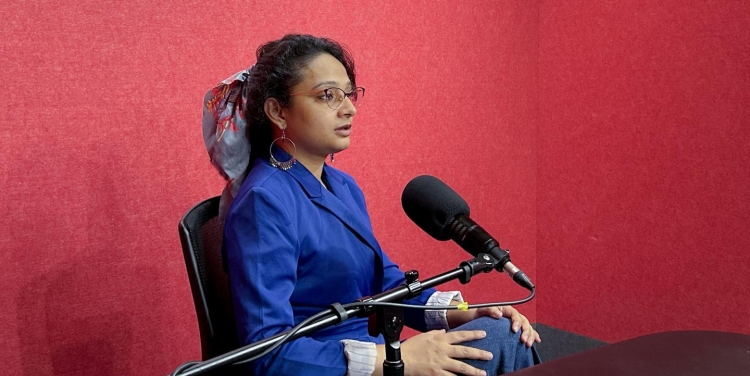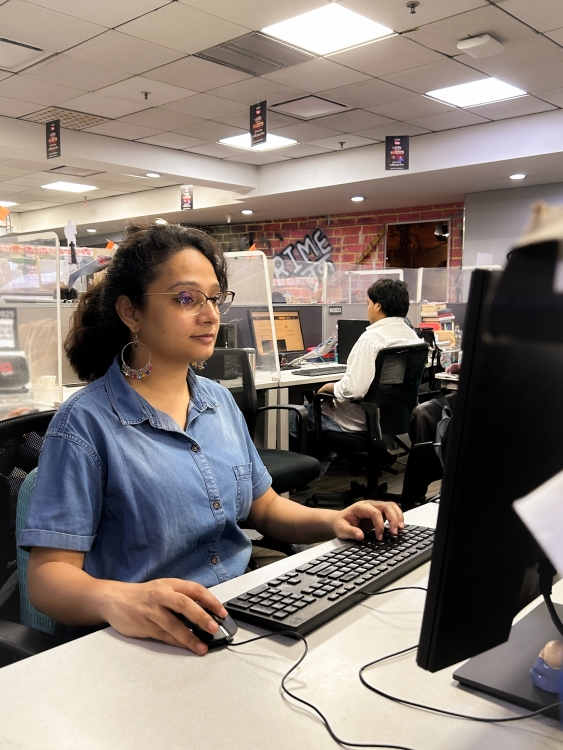Jyoti Dwivedi is more than just a reporter. She is a catalyst, an agent of change.
Writing for India Today and other publications across India, Dwivedi has fact-checked misinformation campaigns, exposed corrupt doctors, uncovered AI exploitation tactics, revealed underground gambling rings and more with her work. Simply put, Dwivedi makes an impact.
“When you get to know how bad things are, that makes me angry,” she said. “When the stories get published and administration actually takes some action – that is very satisfying."
During a career spanning more than 15 years, Dwivedi has taken fake aliases, pretended she was pregnant and skirted the police working undercover. She regularly puts herself at risk for her stories – but shows little fear.
Dwivedi is motivated by a desire to uncover injustices, and though she has already achieved so much, she remains driven to tell more stories.

How did you get your start in journalism?
I started working in 2007. At that time, I used to be a field reporter. That was in my hometown, Kanpur. I did many sting operations during that time. I've worked at several media organizations. Currently, I'm working with the India Today group. India Today Group is one of the mainstream news organizations in India.
I am working with the fact-checking department. We debunk misinformation and disinformation. A lot of stuff keeps coming in from agencies and reporters, and they often also want us to verify certain things. You know, there is certain breaking news in which they want us to fact-check. I’ve been doing this work since 2020.

Have you faced challenges as a woman journalist?
There are very few girls who were allowed to work in a profession like journalism because it’s risky. Almost every day I used to return very late at night, and not everyone is comfortable with that. At that time, I was the only female journalist [on the reporting team].
There are a lot of things girls can do better. I think I took that as an advantage. I took it as an opportunity and I utilized it in the best way possible.
What is it like working undercover?
I went on this sting operation with one of my female colleagues. We had planned, “Okay, one hospital, you become the pregnant woman. In another hospital, I will become the pregnant woman.”
There are doctors who, just to make money [...] say, “Yes, you are pregnant.” Just to earn money, they fool innocent girls. Imagine, these innocent girls might be going to this doctor, and just for some money, they are operating [unneeded abortions] on them. Many of them even die in the process.
In one of the hospitals, I somehow mixed up the names. [The doctor] asked my father’s name, so I said some Muslim name, Irrfan Khan or something. I am a Hindu. My caste, I am a Brahmin – I am used to Hindu names! When he asked, “What’s your mother’s name?” I said a Hindu name. He was so surprised – inter-caste marriages are not very common.
He was like, “How is it possible the wife of Irrfan Khan is Sunita Rajwar?” Somehow, I had to twist the story. I said, “No, no, actually they had a love marriage. Their parents were not in favor of the marriage.” Somehow, I got saved when they would have kicked me out, or maybe even called the police.
How have IJNet and ICFJ supported you?
I came across [ICFJ’s Disarming Disinformation] program on social media, and I applied for it. [The trainings] were very useful. The one that was most useful to me was Craig Silverman’s training on investigating ads.
I recently did a story on online betting. Online betting in India falls in a gray area – we cannot call it completely legal, but there is not one law that governs it. There were hundreds of Facebook pages sharing deep-fake videos of celebrities. Those celebrities were shown endorsing betting websites. In reality, those celebrities have never promoted those illegal websites.
A lot of people fell prey to those websites, and they joined. First, they clicked an ad on Facebook, then [...] you are taken to a Telegram channel – and then they share the link of the actual betting website. In this story, it investigated Facebook ads. Here is where that training […] proved useful to me.
What are your career goals?
When the stories get published and the administration takes some action – that is very satisfying, that I could do something, a small bit at least.
Doing the same things I have already been doing, doing it at a larger level so that the impact is even larger.
This article was first published on IJNet.
Photos courtesy of Jyoti Dwivedi.